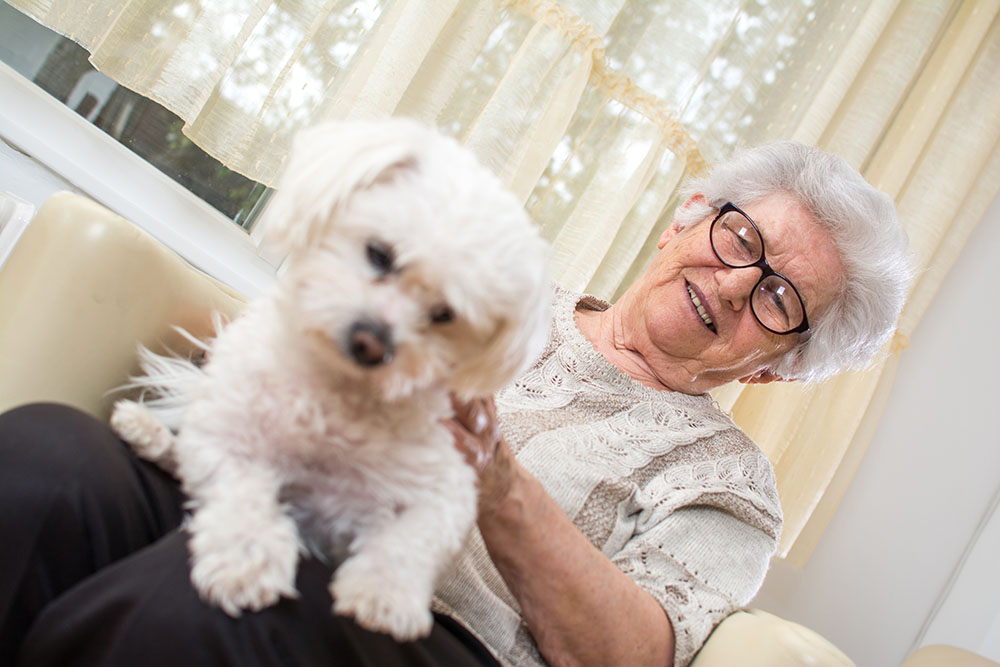Is Dog Ownership a Cure for Loneliness?
06/02/2018
It is perhaps ironic that in this age of social media and constant contact, loneliness is on the rise. Whilst some individuals may appear to be more connected than ever, communities are becoming ever more disconnected. The elderly in particular often find themselves isolated from society. However, research also shows that this ‘epidemic of loneliness’ doesn’t discriminate. Gilbertson & Page decided to discover whether dogs can help to reduce loneliness.
It’s an unfortunate fact that as our world becomes more convenient, people become lonelier. In the past, those living alone would find human contact at shops, libraries, post offices, banks and community groups. Online banking, internet shopping, automatic check outs and cuts in funding to community groups don’t just spell the ‘end of the high street’, they also isolate those members of the community who relied on human contact for a daily chat about the weather, last night’s match or The Great British Bake Off.
The elderly are probably the first people that spring to mind when it comes to lonely people. However, loneliness can also affect young people, single parents and those with disabilities. In a recent survey, the Royal Voluntary Service found that one in three men feel lonely at least once a week. In short, no one is immune from experiencing loneliness in their lives.
Research by the London School of Economics puts the cost of loneliness to the economy at £6000 for every decade of an older person’s life. Furthermore, research by The Big Lunch, an Eden Project initiative, estimates that disconnected communities cost the economy £32 billion a year. These costs mostly come in the form of an increase in use of health and social services. It’s a shame that a problem has to be put into the context of being a cost to the economy before people take it seriously. A sharp rise in loneliness is symptomatic of a deeper problem within our society that should worry us all regardless of the economic price.
In answer to this loneliness epidemic, campaigns such as the Campaign to End Loneliness and the Jo Cox Commission on Loneliness aim to reach out to lonely individuals in society. Finding out more about the reasons for their loneliness ensures that support workers provide a tailored solution. Finally, the key aim is supporting individuals to access the appropriate services in their area. Services might include luncheon clubs, parent and toddler groups, youth clubs, housing associations, exercise classes or charity work.
So, can dogs help to reduce loneliness? Whilst dogs undoubtedly provide a special kind of canine companionship, their ability to answer back in a conversation is minimal. Of course, some people might see this as a good thing! Research has, in fact, found that there is no difference in loneliness between pet owners living alone and non-owners living alone. The important point is that dog ownership specifically can lead to increased human companionship. Taking a dog for a walk in a local park inevitably leads to conversation with other dog owners. Joining breed clubs enables dog owners to meet other owners with a passion for the same breed. Trying out activity clubs broadens the social sphere again and often involves physical exercise. Attending dog shows is a great way of meeting other enthusiastic dog owners. The Kennel Club is a good place to start to find local breed and activity clubs.
Barking Mad is a dog sitting service that understands how dogs reduce loneliness. Many of their hosts sign up to provide the service as a way of having some companionship and meeting people, as Sheila explains in this video. As part of ‘Dogtober’, Barking Mad get involved with coffee mornings, afternoon teas and dog walks in local communities to combat loneliness. Around the festive season, lonely people can feel even lonelier. This is a good time to get out into the community to visit neighbours who live alone. One of Barking Mad’s schemes sees dog owners encouraged to ‘share’ their dogs at Christmas time by taking them along to visit lonely neighbours.
Loneliness can lead to an increased risk of conditions such as dementia, high blood pressure and depression. Owning a dog is known to decrease blood pressure and reduce anxiety; more proof that dogs combat loneliness and its related problems.
When it comes to reasons for dog ownership, having a companion is near the top of the list. 60% of single people in the UK buy a pet for companionship. Not everyone is in a position to own a dog though. Financial restrictions can come into play if owning a dog places an extra burden on a tight household budget. Some people work away or have irregular or very long work hours, which would be unfair on a dog. Yet, it is clear that owning a dog or having some contact with a dog is very beneficial to lonely people, whether the benefits are in improved mental and physical health or an increase in human companionship.
Perhaps this is where schemes and campaigns can really come into their own. By understanding that dogs combat loneliness and as part of providing a personalised solution, support workers can put lonely dog-lovers in the community in touch with schemes that involve canine and human companionship. Hopefully, with more awareness and an increase in community schemes, there will be also be an increase in friendship and a decrease in loneliness.
References:
‘Loneliness: the cost of the last taboo.’
Living Alone? Can Canine Companionship Help Beat Loneliness?



